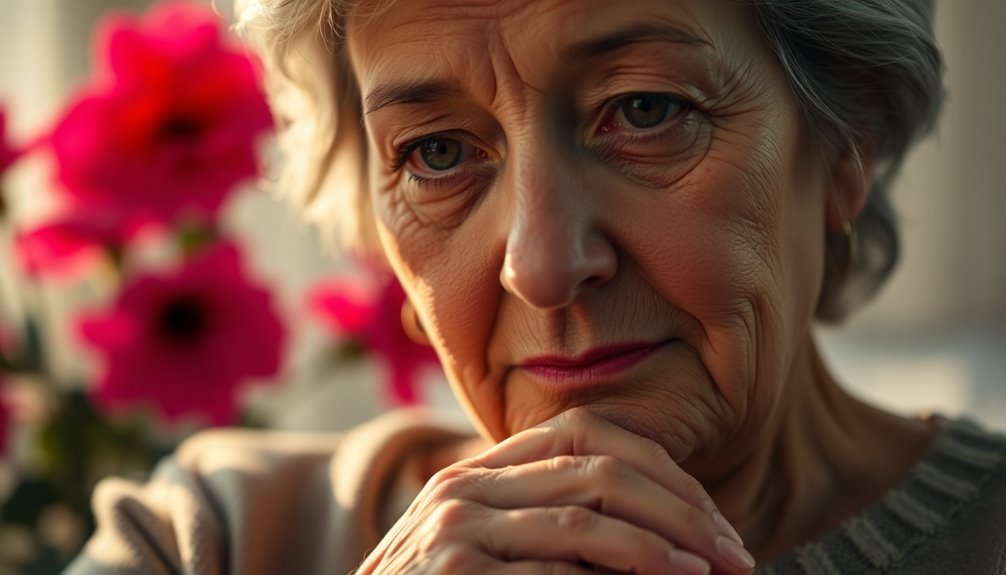Older women may have trouble climaxing due to hormonal changes, health conditions, and psychosocial factors. A decrease in estrogen can lead to dryness and discomfort, while chronic issues like diabetes or hypertension can affect blood flow. Stress, anxiety, or past trauma can also hinder sexual satisfaction. Fortunately, there are ways to enhance your sexual health. Prioritizing a healthy lifestyle, communicating openly with your partner, and exploring medical options like hormone therapy can help. Understanding your body and seeking support are essential. Discovering more strategies can empower you to improve your sexual experiences.
Key Takeaways
- Biological changes, such as decreased estrogen and vaginal lubrication, can lead to discomfort and difficulties in reaching climax for older women.
- Chronic health conditions, like diabetes and cardiovascular disease, impair blood flow, negatively affecting sexual function and pleasure.
- Psychosocial factors, including anxiety, past trauma, and relationship dynamics, can hinder the ability to achieve orgasm.
- Lifestyle modifications, such as improving diet, reducing alcohol, and practicing Kegel exercises, can enhance sexual health and satisfaction.
- Open communication with partners about sexual health and exploring alternative forms of intimacy can improve sexual experiences for older women.
Biological Changes Impacting Climax

As women age, significant biological changes can impact their ability to climax. One of the most notable changes is the drop in estrogen levels after menopause, which can diminish libido and orgasmic capacity. This decrease not only affects your sexual desire but may also lead to vaginal dryness and irritation, making sexual activity uncomfortable or even painful. While testosterone plays a smaller role in women's sexual function, its impact on desire shouldn't be overlooked. Additionally, breast cancer risk increases with age, so it's important for older women to stay informed about their health.
Additionally, the tissues of the labia minora, clitoris, and vagina can become thin and atrophic, contributing to chronic discomfort. You might notice that the uterus and ovaries shrink, and a decrease in muscle support for your reproductive organs could lead to issues like prolapse. A decrease in muscle and connective tissue could also exacerbate these changes and may hinder your ability to reach orgasm, even if you still experience arousal. It's important to remember that despite these changes, many older women report increased sexual satisfaction, often valuing emotional and physical closeness over the act of climaxing itself. Understanding these biological changes can help you navigate this phase of life with greater awareness and adaptability.
Health and Medical Conditions

Health and medical conditions can profoundly influence sexual function in older women. Chronic conditions like diabetes, hypertension, and cardiovascular disease often affect blood flow, which plays a critical role in sexual health. If you're dealing with poor health, you might find yourself less sexually active, and even when you are, sexual problems could arise. Pain and discomfort from these conditions can make intimacy challenging.
Moreover, the medications you take to manage these health issues can also impact your sexual function. For instance, selective serotonin reuptake inhibitors (SSRIs) can cause sexual dysfunction in a significant percentage of women, affecting desire and arousal. Other medications, such as antihistamines and certain cardiovascular drugs, can further decrease sexual desire.
Genitourinary Syndrome of Menopause (GSM) is another key concern, affecting about half of postmenopausal women. Symptoms like vaginal dryness and pain during intercourse can complicate your ability to achieve climax. Additionally, health status often correlates with sexual activity, as poor health can lead to decreased engagement in sexual relationships. Individuals with BPD may experience emotional dysregulation that complicates intimacy and sexual relationships further.
Psychosocial Factors at Play

Steering through the complexities of sexual function in older women often involves considering various psychosocial factors at play. Anxiety and stress can greatly hinder your ability to climax, making it essential to address any underlying worries. Past experiences, such as sexual or emotional abuse, can also create barriers, leading to difficulties with orgasm. If you've struggled with mental health conditions like depression, you're not alone; these issues are common in women facing orgasmic disorders.
Additionally, understanding the impact of vibrational energy on overall well-being can provide insights into enhancing sexual experiences.
Relationship dynamics matter too. A lack of emotional intimacy with your partner can affect your orgasmic ability. Unresolved conflicts or poor communication about sexual needs can create further obstacles. Additionally, if trust has been compromised—due to infidelity or your partner's sexual dysfunction—it can severely impact your sexual experience.
Cultural and societal factors also play a role. Guilt or embarrassment stemming from cultural beliefs about sex can influence your ability to enjoy sexual pleasure. Addressing negative thoughts and focusing on positive experiences during intimacy can help shift your mindset and improve your sexual satisfaction. Remember, understanding these psychosocial factors is a crucial step toward a fulfilling sexual life.
Lifestyle and Behavioral Influences

Many women may not realize how lifestyle and behavioral choices can greatly influence their ability to climax. Factors like medication, health conditions, and personal habits all play a role in sexual function. For instance, certain medications, including SSRIs and antihistamines, can hinder arousal and orgasm. Chronic health issues, such as high blood pressure, also impact blood flow, which is vital for sexual response. Additionally, aging women often experience increased prevalence of sexual complaints, particularly decreased desire, which can further complicate the ability to climax. Regular consumption of high-fat foods like ice cream may also contribute to health issues that affect sexual function.
Here are some lifestyle adjustments you might consider:
- Moderate Alcohol Consumption: While excessive drinking impairs sexual function, moderate consumption can enhance your experience.
- Regular Masturbation: Engaging in this practice can improve awareness of your body and boost arousal.
- Focus on Education and Nutrition: Higher education levels are linked to better sexual performance, and maintaining a healthy diet can positively affect your sexual health.
Prevalence of Climax Issues

As women age, the prevalence of climax issues becomes a significant concern, particularly for those in middle age and beyond. Studies show that between 16% and 37% of women experience orgasmic dysfunction. In a study involving 14,000 women aged 40 to 80, 16% reported an inability to reach orgasm. This figure increases with age; among women aged 57 to 85, 34% struggle to achieve climax.
The prevalence of these issues often rises after the age of 60, largely due to hormonal changes like decreased estrogen levels, which can lead to vaginal dryness and discomfort during intercourse. Emotional dysregulation related to aging can also complicate sexual experiences. Health conditions, such as diabetes and cardiovascular disease, also contribute to these difficulties by affecting blood flow and nerve sensitivity in the genital area. Additionally, most older women remain sexually active if partnered, highlighting the importance of relationship quality in addressing climax issues.
Additionally, psychological factors like depression, stress, and relationship issues can further complicate sexual satisfaction. With so many variables at play, it's clear that climax issues are not uncommon among older women, making it essential to understand and address these concerns as they arise. Recognizing the prevalence of these issues is the first step toward finding solutions and improving sexual health.
Interventions for Improvement

- Lifestyle Changes: Prioritize rest, maintain a healthy diet, and engage in Kegel exercises to strengthen pelvic muscles. Limiting alcohol and smoking can also enhance sexual function. Furthermore, addressing certain antidepressants may be crucial, as they can contribute to orgasmic dysfunction. Regular puppy socialization can also promote overall well-being and reduce stress, which may positively impact sexual function.
- Educational Interventions: Learn about female sexual anatomy and engage in directed masturbation to understand your body better. Therapy options like cognitive behavioral therapy (CBT) can help address negative thought patterns affecting your sexual experiences.
- Medical Options: Consult a healthcare provider to review medications, especially SSRIs, which may contribute to orgasmic dysfunction. Hormone replacement therapies and vaginal rejuvenation treatments can restore sensation.
Communication With Partners

Open communication is essential when addressing sexual difficulties in older women. Discussing your sexual health with your partner can help mitigate distress, especially since sexual difficulties are common. Only 9.5% of women aged 65-74 report distress about their sex life, indicating that open dialogue can reveal underlying issues. Normalizing conversations about sexual concerns is important; it allows both partners to understand each other better and explore solutions together. Additionally, establishing a cooperative co-parenting plan can enhance emotional support, which is crucial for maintaining intimacy.
Your partner's health plays a significant role in your sexual activity. Many women report reduced sexual experiences due to their partner's health issues. If you're handling these challenges, it's important to communicate openly about how health conditions impact intimacy. This dialogue can shift your focus from penetration to other forms of intimacy, fostering connection. Sexual difficulties are more prevalent among older women compared to younger counterparts, which further emphasizes the need for these conversations.
Addressing societal stigmas around older women and sexuality also matters. By talking openly, you can challenge age-related misconceptions and redefine your sexual experiences. Encourage your partner to share their feelings too; this mutual communication can strengthen your relationship and enhance your sexual satisfaction. Remember, it's not just about the act of sex, but about intimacy and connection, which are essential at any age.
Embracing a Healthy Lifestyle

Maintaining a healthy lifestyle plays a significant role in enhancing sexual health for older women. As you age, your physical health directly influences your sexual activity and function. Many women remain sexually active well into their 70s and 80s, but chronic conditions or poor health can reduce sexual desire and performance. Embracing a healthy lifestyle can combat these challenges. Here are key areas to focus on:
- Regular Exercise: Engaging in moderate physical activity boosts circulation, enhances mood, and can improve sexual function. It's important to note that up to 50% of sexually active older women report distressing sexual problems, highlighting the need for proactive health measures. Additionally, incorporating activities like hula hooping can make exercise enjoyable and help maintain fitness levels.
- Balanced Diet: Eating a diet rich in fruits, vegetables, and whole grains supports overall health and hormone balance, which are essential for sexual well-being.
- Healthy Weight Management: Maintaining a healthy weight can alleviate some of the physical issues impacting sexual performance and comfort.
Frequently Asked Questions
Can Menopause Completely Stop a Woman From Experiencing Orgasm?
Menopause can considerably impact your ability to experience orgasm, but it doesn't completely stop it. Changes in hormone levels, vaginal dryness, and reduced sensitivity can make climaxing more difficult. However, many women still find ways to achieve orgasm through various treatments and lifestyle adjustments. Exploring different methods, like using lubricants or vibrators, and communicating openly with your partner can enhance your sexual experience and help you regain pleasure.
Are There Alternative Therapies for Enhancing Sexual Function?
Imagine a garden wilting under the sun's relentless heat; without care, it struggles to bloom. Fortunately, there are alternative therapies for enhancing sexual function. You can explore vaginal lubricants, pelvic physical therapy, and topical treatments that provide relief. Medications like osphena or intrarosa can also help. Don't underestimate the power of open communication with your partner and healthcare provider, as understanding and support can nurture your sexual health back to life.
How Does Body Image Affect Older Women's Sexual Experiences?
Body image greatly affects your sexual experiences as an older woman. When you feel good about your body, you're more likely to engage in and enjoy sexual activities. Conversely, negative body image can lead you to avoid intimacy due to embarrassment or shame. Supportive partners and open communication can help alleviate these feelings. Remember, self-acceptance and emotional intimacy often matter more than physical appearance in achieving sexual satisfaction and connection. It’s also important to address specific concerns, such as embarrassing odors in older women, which can arise due to natural hormonal or biological changes. These issues, while common, are often treatable and open communication with a healthcare provider or partner can make a significant difference in managing them. Fostering self-confidence and prioritizing emotional closeness can help overcome such barriers and enhance both intimacy and overall sexual satisfaction.
What Role Does Intimacy Play in Achieving Climax?
They say, "A strong tree grows from deep roots." Intimacy plays a crucial role in achieving climax because it fosters emotional and physical connection. When you nurture closeness through affection and communication, you enhance your sexual satisfaction. Sharing non-sexual moments, expressing desires openly, and adapting to each other's needs can create a safe space for exploration. Remember, it's not just about the act but the bond you share that ignites pleasure.
Can Certain Foods Improve Sexual Health and Function?
Yes, certain foods can definitely improve your sexual health and function. Incorporating watermelon, beets, and garlic into your diet can enhance blood flow, which is essential for sexual performance. Foods rich in antioxidants like berries and dark chocolate can boost circulation and elevate your mood. Don't forget about zinc-rich options like oysters and nuts, as they help regulate testosterone levels. By choosing these foods, you're actively supporting your sexual well-being.









